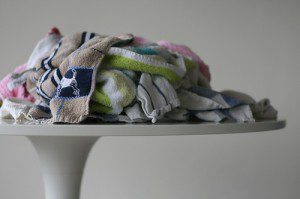I’ve been doing laundry for myself since college and it’s always been a source of frustration for me.
In college, I threw everything in together and washed it all on cold. Separating my clothes seemed too time-consuming.
As a newlywed, I visited the laundromat with my husband. I didn’t mind it so much, sitting together in the warmth of the dryers, finishing all our laundry at once.
Nearly 20 years later, our family of five creates a lot of laundry.
You would think — after 20 years — that I would have figured out a better system for laundry.
But — no.
Up until last week, my laundry process included gathering up laundry whenever I thought to, starting a load whenever I remembered, counting on my sitter to throw it in the dryer, and letting laundry pile up on the couch waiting to be folded.
Oh, and stacking piles of folded laundry on my bed, only to transfer them to the floor at bedtime.
We always have clean clothes but that’s really about all I can say.
Last week, I decided I need a new process. Hold it. Last week I decided I needed a process, period.
So, I implemented one.
Every morning, before I start breakfast for the girls, I gather up all the laundry in the house and throw in a load.
It’s done around the time I leave to take the girls to school, so I transfer it to the dryer.
When I get back home, if it’s dry, I fold it and carry it upstairs before I sit down at my desk to work. I also start another load.
Using this process, I stayed caught up with laundry all week.
Anybody want to guess how many loads it took this week for me to stay caught up? 15. (Intense, isn’t it?)
Fifteen loads of laundry, left until Saturday, would have looked like Everest. Spread out across 6 days, not bad at all.
So, here are my lessons about process improvement:
You have to HAVE a process to improve a process. Although there was much room for improvement in how I completed the laundry (for more than 20 years), I couldn’t pull apart a process and look for hang-ups because I didn’t have any static process in place. Haphazard is not a process.
You have to be committed to the process. The only way this process is going to continue to work is if I continue to follow it. I could easily slip back into my bad habits. Since I have now created a process, I have something to return to, at least. And now that I have announced my new process to the world via this blog post, I am certainly committed.
You have to stay focused on the benefits of the process. The benefits to my process are huge: an orderly home, wrinkle-free shirts that stay wrinkle-free, and a couch that I can relax on at the end of the day.
Tell me something! Do you have a process for laundry at your house? How many loads of laundry do you do every week? What is your best process improvement lesson and how did you learn it?

I am the founder/CEO of the Weaving Influence team, the author of Reach: Creating the Biggest Possible Audience for Your Message, Book, or Cause, and the host of the Book Marketing Action Podcast. I’m a wife and mom of three kids, and I enjoy running, reading, writing, coffee, and dark chocolate.



Wee 15 loads a week. I’m very very bad about laundry, I really don’t mind doing it but I’m terrible about putting it away which frustrates me to no end. If I fold my 11 yr olds laundry and give it to her I see folded clothes mixed in with her dirty clothes later. I need a system too.
Erin,
I still need to come up with a process for getting my kids to put their laundry away.
I have the same problem.
Let me know if you figure something out!
And thanks for stopping by!
Becky
An idea for putting away: I bring clean laundry into the living room and dump it on the couch to fold. Each kid’s laundry goes in a particular spot on the couch and they know to check for clean laundry after school. Last one to put away his folded laundry is the next day’s laundry helper. Dumping folded laundry in your floor = lots of time as laundry helper. It works pretty well here. 🙂
I keep a basket per child and put all folded laundry into it when I have some. They have to put away anything in their basket as soon as they get home from school. I still help the 4 yr old but the older girls can do it on their own. I did have to get their drawers emptied a bit and organized so they wouldn’t get too frustrated. I hope to get them more involved once they get used to this.
Becky, what a fun post, and so pertinent after just finishing Lolly’s leadfromwithin chat on perseverance. My wife does most of the kids laundry and some of mine when she’s in the mode. She is like a humming bird, never stops moving. We are also slowly teaching the kids do do their own and I usually do mine at the end of the week. I like your process though as it seems like a good one. Any improvement requires some process for sure, most systems require feedback and gathering your laundry every day certainly gives you this, making the system much more efficient.
As for putting away, I call the kids when it is ready to be put away. Just has to get done before any more play and done neatly. If I do this with the kids it also helps me because I would have stuff lying around otherwise. If we do it at the same time then they see it as just something one does as part of living. I am putting my stuff away so to are they. They get to put it where they want it (as long as it is in drawers or in a cupboard), so they are in control.
All I can say is I am glad I do not have to iron. That would be another matter and require some serious process and perseverance.
Thanks for the fun post,
Simon
Fist of all glad to see you writing 🙂 A great demonstration of important lessons. For me processes that work are more about sticking to simple principles than defining tasks and time frames. We apply the philosophy “if you see the garbage can is full it is your job to take out the garbage” to a lot of thing including laundry.
Whoever sees the laundry bin is full or needs something washed puts in a load. If you see a sorted pile ready to go in the washer, you throw it in. If you hear the buzzer on the washer ring it is up to you to put the clothes in the dryer. The trick is to all be committed and holding each other accountable when we get lazy and try to look the other way. Sometimes we drop the ball and one of us always seems to pick it up including my 11 year old. Somehow I always have clean clothes to wear, the bins never get out of hand and we never argue about whose turn it is so it seems to be working for us.